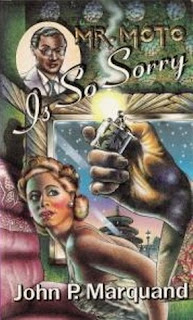Mr Moto Is So Sorry, published in 1938, was the fourth of John P. Marquand’s Mr Moto spy novels.
Between 1937 and 1939 eight Mr Moto movies were made, all starring Peter Lorre. The Mr Moto of the movies differs somewhat from the Mr Moto of the books. In the movies Moto is an international policeman, a Japanese Interpol agent. In the books he is a Japanese spymaster.
Which is not to suggest that Mr Moto is the villain of the books. Far from it. When the first four Moto novels were published the U.S. and Japan were at peace. There were tensions but there were all sorts of international tensions during the 1930s. In the Far East those tensions involved not just the U.S., China and Japan but other powers including the Russians and the French. Mr Moto is loyal to Japan but he is by no means hostile to America or Americans.
In the novels various Americans get themselves mixed up in international intrigue in various parts of Asia. Mr Moto is always on the scene somewhere. His first priority is always his duty to the Emperor but he usually ends up extricating those various Americans from awkward situations.
Calvin Gates is in an awkward situation. He is a young America anthropologist on his way to join the Dilbreth Expedition in Mongolia. At least he claims to be an anthropologist. He has reasons for preferring to be in Mongolia rather than home in the States. Those reasons involve a misunderstanding about a cheque, a misunderstanding about which the American police might be inclined to be tiresome.
On the ship from Japan to Korea Gates meets a young American woman, Miss Dillaway. She is heading for Dilbreth’s expedition as well. She is an artist and her job will be to make drawings of the finds made by the expedition. Miss Dillaway is young, beautiful, fiercely independent and bad-tempered. She tells Gates to call her just Dillaway (she hates her Christian name which is Sibyl).
Gates also meets a very polite mild-mannered Japanese gentleman named Moto. Mr Moto assures him that he is not connected with the police but it is obvious that Moto has a surprising amount of influence. Officials defer to Mr Moto in a remarkably obsequious way.
Dillaway has in her possession a silver cigarette case with a rather attractive design featuring birds. It was given to her in odd circumstances. Someone wants that cigarette case. A man gets shot because of it.
Gates and Dillaway have no idea what the significance of the cigarette case is. Mr Moto knows, but Mr Moto is playing a very complex and very dangerous diplomatic game for the highest of stakes and he believes it’s best for the two young Americans to know as little as possible. The more they know the more likely they are to be killed.
An Australian ex-soldier named Hambly wants the cigarette case but Gates is not inclined to trust him. Hambly could be working for some government or he could be working for himself or, more likely, he could be planning to double-cross everybody.
The problem is that Gates has figured out that he and Dillaway are in danger if they have the cigarette case but they’re probably in just as much danger if they don’t have it.
The plot gets more and more complicated. The cigarette case is more than just a McGuffin. The meaning of that cigarette case is crucial to the plot.
The story builds to a remarkably tense finale in Mongolia. The losers in this game are not going to escape with their lives. A lot depends on how Gates plays things. He’s decided he’s sick of doing what other people tell him to do. He’ll make his own decisions. He knows how dangerous the game is but for the first time in his life he feels truly alive.
Mr Moto is not actually the protagonist in any of the novels but he’s always the most important character. He’s the one pulling the strings. He’s the catalyst for everything that happens. The other characters slowly come to realise how much they have underestimated him. Mr Moto doesn’t mind if people think he’s a fool. That can be a huge advantage for a secret agent. Mr Moto is a very dangerous very powerful man but he doesn’t like people to realise that.
There were all sorts of political factions within Japan in the 1930s and the political infighting was vicious and bloody. Mr Moto belongs to a moderate faction. He would prefer to see Japan’s political objectives achieved peacefully. He thinks violence is clumsy and unpleasant. He prefers subtle means. But he can still be very very dangerous.
Mr Moto is generally a very sympathetic character. He’s likeable even when he’s dangerous.
Gates makes a fine hero who slowly grows in stature as the story unfolds.
Mr Moto Is So Sorry is a top-notch spy thriller. Highly recommended.
I’ve reviewed other Mr Moto novels - Your Turn, Mr Moto (1936), Thank You, Mr Moto (1936) and Think Fast, Mr Moto (1937).


I'll have to keep an eye out for this - the first Mr Moto novel was very impressive!
ReplyDeleteThe good news is that used copies of the Mr Moto books are not too difficult to find.
Delete